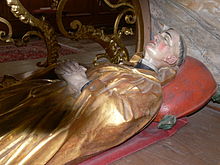Ulrich von Zell

Ulrich von Zell (* approx. 1029 ; † 1093 ), also called Ulrich von Regensburg , Ulrich von Cluny , Ulrich vom Möhlinstal or Ulrich vom Breisgau , was a Benedictine and founder a. a. of the St. Ulrich monastery in the Black Forest . He is venerated regionally as a saint ; his feast day is July 14th.
Ulrich von Zell / Cluny appears in the 2nd half of the 11th century as a prominent representative of the Benedictine reform monasticism that originated in the Burgundian Abbey of Cluny. Ulrich, born around 1029, was the son of a Regensburg merchant Bernwald. Through his mother, Bucca, he was related to the Holy Bishop Ulrich von Augsburg . Since they had been waiting for children for a long time, his parents are said to have vowed to St. Magnus von Füssen that he would dedicate a healthy child to the service of the church. He was a godchild of Emperor Heinrich III. (1039-1056) and received his spiritual training together with Wilhelm von Hirsau in the Regensburg monastery of Sankt Emmeram . From 1044 he was a member of the imperial court orchestra (office) , from which he probably had to resign because of his father's conspiracy with the hostile Hungarians .
His paternal uncle, Bishop Nitger von Freising , took in Ulrich and appointed him vicar general of the diocese. In search of his vocation he undertook an adventurous pilgrimage to the Holy Land around 1051 , during which his office was transferred to someone else. The founding of a monastery on a property belonging to him in Regensburg failed due to the resistance of Regensburg Bishop Otto. Presumably Ulrich already backed the reforms that led him to join the Cluny monastery around 1063. As a confessor and advisor to the eminent Abbot Hugo (1048–1109), Ulrich's ascetic attitude had a wide range of effects. Participation in the establishment of the Rüeggisberg priory (after 1070/1071) and the management of the Peterlingen priory ( Payerne ; around and after 1075) belong here. Ulrich clashed there with Bishop Burkhard, whom he criticized for his worldly lifestyle. Returning to Cluny, Ulrich wrote a biography of Margrave Hermann I (Baden) , who had also entered Cluny as a simple monk. At the request of his childhood friend Abbot Wilhelm von Hirsau (1069-1091) Ulrich wrote and sent the Consuetudines ( Antiquiores consuetudines Cluniacensis monasterii ) recorded by him in Cluny between 1079 and 1086 , an important work in three volumes for the history of the Cluniac reform.
Abbot Hugo von Cluny, with whom Ulrich, according to his biographers, enjoyed a special position of trust and for whom he undertook legation trips at the end of the 1070s, Ulrich probably sent to the Breisgau at the beginning of the 1080s, where the noble Hesso, a member of a branched out branch Southwest German noble family, according to the proof of the imperial donation of July 27, 1072 the Cluny monastery in Rimsingen had given property with the intention of founding a monastery and which was moved a few years later to the neighboring Grüningen (Breisach) . Since Ulrich, according to his biographers, appeared to be too restless on the busy trade route, he moved the convent in 1087 with the help of the Bishop of Basel , Burkhard von Fenis , to the quiet valley of the Möhlin (Rhine) , as its prior until his death worked and where St. Ulrich in the Black Forest with its monastery complex was given its later name by Peter Thumb . Ulrich sat down together with Abbots Wilhelm von Hirsau and Siegfried von Schaffhausen for the choice of the reform-oriented Gebhard III. von Zähringen , to the Bishop of Constance . Approx. Blinded in 1090, Ulrich died in his priory in 1093 after Abbot Hugo had asked him in vain to return to Cluny. In various vitae Ulrich is depicted as a saint and venerated as such in the Archdiocese of Freiburg.
literature
- Michael Buhlmann: Benedictine monasticism in the medieval Black Forest. A lexicon . Lecture at the Schwarzwaldverein St. Georgen eV, St. Georgen im Schwarzwald, November 10, 2004, Part 2: N – Z (= Vertex Alemanniae, H. 10/2), p. 102
- Dieter Heck: Ulrich von Zell. Committed to reform (Hagiography / Iconography / Folklore; No. 105). Schnell + Steiner, Munich and Zurich 1992
- Johannes Madey: Ulrich von Zell. In: Biographisch-Bibliographisches Kirchenlexikon (BBKL). Volume 19, Bautz, Nordhausen 2001, ISBN 3-88309-089-1 , Sp. 1453-1455.
- Florian Lamke: Cluniac on the Upper Rhine. Conflict resolution and noble group formation in the time of the investiture dispute (= research on the history of the Upper Rhine region, vol. 54), Freiburg / Munich 2009, esp. Pp. 136–152
- Wolfgang Müller: St. Ulrich . In: The Benedictine monasteries in Baden-Württemberg . (= Germania Benedictina, Vol. 5), Ottobeuren 1976, p. 615
- E. Tremp: Ulrich von Zell . In: Lexicon of the Middle Ages (LexMA). Volume 8, LexMA-Verlag, Munich 1997, ISBN 3-89659-908-9 , Sp. 1205-1026.
Individual evidence
Web links
- Udalricus Cellensis in the repertory "Historical Sources of the German Middle Ages"
- Literature by and about Ulrich von Zell in the catalog of the German National Library
| personal data | |
|---|---|
| SURNAME | Ulrich von Zell |
| ALTERNATIVE NAMES | Ulrich of Regensburg; Ulrich von Cluny |
| BRIEF DESCRIPTION | Benedictine and founder of the St. Ulrich monastery in the Black Forest; Saint |
| DATE OF BIRTH | around 1029 |
| DATE OF DEATH | 1093 |